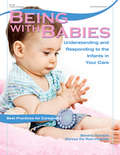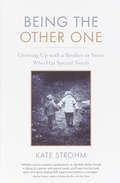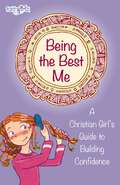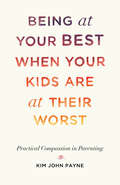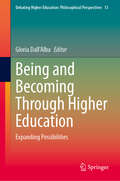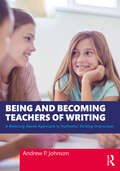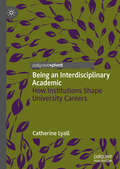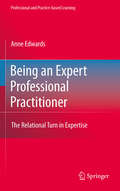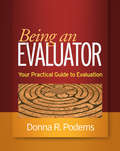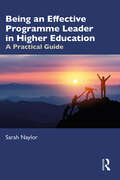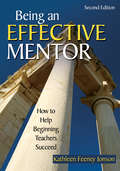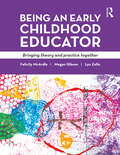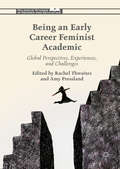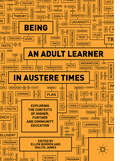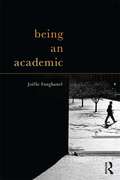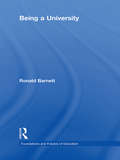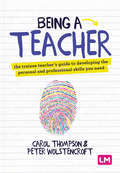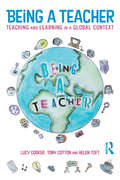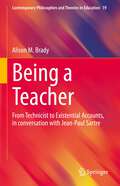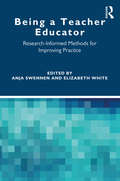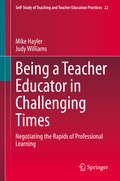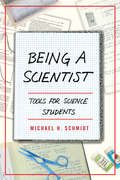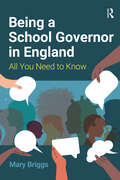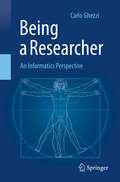- Table View
- List View
Being with Babies: Understanding and Responding to the Infants in Your Care
by Beverly Kovach Denise De Ros-VoselesBeing with Babies is a great resource for both beginning and experienced caregivers. Each chapter describes an issue that caregivers face daily, offers scenarios that illustrate the challenge, suggests solutions caregivers can use to address the issue, and concludes with a review of key points. Being with Babies teaches caregivers how to handle everyday challenges while learning about developmental stages. This hands-on resource is perfect for caregivers of children 6 weeks to 18 months old, as well as for staff development and resource libraries. Following the Resources for Infant Educarers (RIE) approach and philosophy, the authors of Being with Babies demonstrate that from the day of birth, infants are unique individuals with a capacity to participate in relationships and interact with the people and objects in their environment.
Being the Other One: Growing Up With A Brother Or Sister Who Has Special Needs
by Kate StrohmWhen there's a disabled child in the family, how are normally developing siblings affected? According to Kate Strohm, a counselor and health educator, siblings of the disabled face particular emotional challenges that are often overlooked. Able siblings commonly struggle with feelings of isolation, grief, anger, and anxiety—and these and other emotional issues can have lifelong effects.Being the Other One is based on the author's own experience (as a sibling of a sister with cerebral palsy) and on extensive interviews she conducted with siblings of all ages. In clear and compassionate terms, Strohm explores the often secret feelings of siblings and offers valuable strategies for coping with the challenges they face.Being the Other One reveals the difficulties faced by siblings at all stages of life, from early childhood through adulthood, when siblings must often assume responsibility for the care of their disabled brothers and sisters. Though the book looks honestly at the many challenges that siblings face, it is full of encouragement and practical strategies. Strohm emphasizes that when siblings are able to clearly identify and openly express their feelings and concerns—and when parents and health professionals offer the needed support—siblings can thrive. This book includes writing exercises for personal exploration and a substantial resources section listing helpful books, organizations, and websites.
Being the Best Me: A Christian Girl’s Guide to Building Confidence (Faithgirlz)
by Kristi Holl Nancy N. Rue Lois Walfrid Johnson Suzanne Hadley GosselinHave you ever had thoughts like these …I’m so stupid.I’ll never get an A in math.I’m sure the whole world is staring at the zits on my chin.Why can’t I be as pretty as the popular girls?We’ve all been there. Some days it seems like every other girl is smarter, prettier, stronger, or more talented. But did you know that God designed you exactly the way he wants you to be? From the top of your head to the ends of your toes, God made you special, with all the right skills, talents, dreams, and passions.This eBook collection is all about what makes you beautiful, one-of-a-kind, and outrageously loved by God. Including several full-length eBooks by your favorite Faithgirlz authors and excerpts from many more, the relevant devotions, helpful advice, and fun tips in this collection will have you better loving yourself and the creative God who made you.Selections included are from The Skin You're In, The Beauty Book, and The Uniquely Me Book, as well as tons of devotional thoughts from many other Faithgirlz favorites.
Being at Your Best When Your Kids Are at Their Worst: Practical Compassion in Parenting
by Kim John PayneA practical, meditative approach that can be used in the moment to help you stay calm and balanced when your child's behavior is pushing you to your limit--by the popular author of Simplicity Parenting.When children are at their most difficult and challenging situations arise, how can we react in a way that reflects our family values and expectations? Often, when children “push our buttons,” we find ourselves reacting in ways that are far from our principles, often further inflaming a situation. When our children are at their worst, they need us to be at our best—or as close to it as we can be. Educator and family counselor Kim John Payne, author of Simplicity Parenting, offers techniques that simply and directly shift these damaging patterns in communication and parental behavior. These grounded and practical strategies will help you: • Slow down the interaction • Be more in control of your reactions • Open up a much wider range of helpful responses • Sense what your child’s deeper needs are even though they are misbehaving • Respond in a way that gives your child a feeling of being heard and still puts a boundary in place Payne’s meditative approach can be done anywhere, anytime; it lifts you out of old, unwanted patterns of action-reaction and prepares you so that the voice you speak with is closer to the parent you want to be. His concrete and simple techniques can help you, and your children, be at your best, even in the most challenging of times.
Being and Becoming Through Higher Education: Expanding Possibilities (Debating Higher Education: Philosophical Perspectives #13)
by Gloria Dall’AlbaThis book focuses on the importance of an ontological dimension for today’s higher education, with critical attention to implications for the student experience, engagement, satisfaction, wellbeing, employability, (dis)embodiment and activism in which students take a stand on their own being and becoming. In accessible language, key philosophical ideas are explored for their relevance to contemporary higher education, integrating philosophical with pedagogical perspectives. Although much of the material has been published previously, there is value in bringing it together into a single volume in exploring an ontological dimension of higher education as it is embodied. In doing so, the book demonstrates benefits to pedagogy through sustained attention to philosophy and theory, and vice versa, thereby contributing to recent heightened interest in the philosophy and theory of higher education. This book is intended to prompt re-imagining the ways in which higher education is conceived and conducted. An argument is put forward for greater emphasis on expanding possibilities for knowing, acting and being, toward fuller lives of interdependence with others and things in an interconnected world. Through highlighting an ontological dimension in this manner, a hope-filled future emerges for higher education.
Being and Becoming Teachers of Writing: A Meaning-Based Approach to Authentic Writing Instruction
by Andrew P. JohnsonThis engaging, inviting textbook from a renowned expert in writing education provides all the knowledge, pedagogical strategies, and tools needed to enable any teacher to be an effective teacher of writing.Using the five-step writing process as a foundation, the text describes how to teach the necessary skills related to grammar, spelling, punctuation, and other writing mechanics, and addresses all major genres and stages of writing. Written in an authentic voice that exemplifies good writing, Johnson presents a variety of pragmatic, research-based strategies that support students’ writing development and encourage teachers to apply their own creativity and intelligence in the classroom.This is an essential text for courses in writing instruction, literacy methods, and teaching English Language Arts (ELA).
Being an Interdisciplinary Academic: How Institutions Shape University Careers
by Catherine LyallThis book highlights the importance of interdisciplinarity in the academic landscape, and examines how it is understood in the context of the modern university. While interdisciplinarity is encouraged by research funders, academics themselves receive mixed messages about how, when and whether to follow this route. Building upon a series of career history interviews with established interdisciplinary researchers, the author reveals fundamental misunderstandings about the nature of interdisciplinary knowledge, how this is shared, and the skills these researchers bring. The book addresses these issues on both a personal and systemic level, identifying how a resilient researcher can craft their own research trajectory to view interdisciplinarity as a truly embedded approach.
Being an Expert Professional Practitioner: The Relational Turn in Expertise (Professional and Practice-based Learning #3)
by Anne EdwardsProfessionals deal with complex problems which require working with the expertise of others, but being able to collaborate resourcefully with others is an additional form of expertise. This book draws on a series of research studies to explain what is involved in the new concept of working relationally across practices. It demonstrates how spending time building common knowledge between different professions aids collaboration. The core concept is relational agency, which can arise between practitioners who work together on a complex task: whether reconfiguring the trajectory of a vulnerable child or developing a piece of computer software. Common knowledge, which captures the motives and values of each profession, is essential for the exercise of relational agency and contributing to and working with the common knowledge of what matters for each profession is a new form of relational expertise. The book is based on a wide body of field research including the author's own. It tackles how to research expert practices using Vygotskian perspectives, and demonstrates how Cultural Historical and Activity Theory approaches contribute to how we understand learning, practices and organisations.
Being an Evaluator: Your Practical Guide to Evaluation
by Donna R. PodemsDemystifying the evaluation journey, this is the first evaluation mentoring book that addresses the choices, roles, and challenges that evaluators must navigate in the real world. Experienced evaluator and trainer Donna R. Podems covers both conceptual and technical aspects of practice in a friendly, conversational style. She focuses not just on how to do evaluations but how to think like an evaluator, fostering reflective, ethical, and culturally sensitive practice. Extensive case examples illustrate the process of conceptualizing and implementing an evaluation--clarifying interventions, identifying beneficiaries, gathering data, discussing results, valuing, and developing recommendations. The differences (and connections) between research, evaluation, and monitoring are explored. Handy icons identify instructive features including self-study exercises, group activities, clarifying questions, facilitation and negotiation techniques, insider tips, advice, and resources. Purchasers can access a companion website to download and print reproducible materials for some of the activities and games described in the book.
Being an Effective Programme Leader in Higher Education: A Practical Guide
by Sarah NaylorBeing an Effective Programme Leader in Higher Education is a practical guide designed to help navigate the complex academic, pastoral, and administrative challenges that come with working in this position. This book looks at topics such as leadership, personal tutoring, and academic and student support mechanisms from the unique perspective of the programme leader. It gives suggestions for effective ways to lead a programme, incorporates practical advice on some key leadership skills, and offers proven strategies from across various contexts within the role. Vignettes, which include descriptions of authentic situations provided by programme leaders, sit alongside probing questions to prompt reflection for professional development. This practical text is a must-read for programme leaders working in higher education and provides the guidance necessary to help them create an environment that is inclusive, caring, compassionate, and supportive.
Being an Effective Mentor: How to Help Beginning Teachers Succeed
by Kathleen F. JonsonThis updated edition provides information on stages of teacher development, professional growth, assessment of student work, mentors within teacher induction programs, and components of successful mentoring initiatives.
Being an Early Childhood Educator: Bringing theory and practice together
by Felicity McArdle Megan Gibson Lyn Zollo'This book will be an invaluable resource for pre-service early childhood educators as they prepare not only for their placements but also their future careers. The examples, activities and reflection points are realistically representative of events and contexts across the birth to 8 years age range. These features effectively scaffold the pre-service teacher's preparation and thinking for socially just early childhood teaching.' - Associate Professor Susan Krieg, Early Childhood Program Coordinator, Flinders UniversityMaking the transition from pre-service teacher to professional can be challenging. From field experience placements, or 'pracs', to the early years in the classroom, this text provides a comprehensive and practical guide to help every early childhood student develop their professional expertise and confidence.The authors prompt students to bring together theories learned at university with ways of working with real children in real settings, framed by the principles of recognising equity and diversity. There is clear guidance on how to be successful 'on prac', including understanding the many roles pre-service teachers will be expected to take on, and the important relationships they need to build. Lesson planning, understanding curriculum documents and fail-safe strategies for teaching in a wide range of situations and with children from wide-ranging backgrounds are all covered in depth. Suggestions for tutorial activities and further reading accompany each chapter, prompting students to engage in critical reflection and self-evaluation, while the 'On track on prac' feature will help pre-service teachers monitor and review their progress. Readers are also provided with insights from 'real world' pre-service students and professional teachers who have mentored many different students on prac.This is an essential text for all students undertaking practicums and preparing for the first years of their professional careers.
Being an Early Career Feminist Academic: Global Perspectives, Experiences and Challenges (Palgrave Studies in Gender and Education)
by Rachel Thwaites and Amy PresslandThis book highlights the experiences of feminist early career researchers and teachers from an international perspective in an increasingly neoliberal academy. It offers a new angle on a significant and increasingly important discussion on the ethos of higher education and the sector's place in society. Higher education is fast-changing, increasingly market-driven, and precarious. In this context entering the academy as an early career academic presents both challenges and opportunities. Early career academics frequently face the prospect of working on fixed term contracts, with little security and no certain prospect of advancement, while constantly looking for the next role. Being a feminist academic adds a further layer of complexity: the ethos of the marketising university where students are increasingly viewed as ‘customers’ may sit uneasily with a politics of equality for all. Feminist values and practice can provide a means of working through the challenges, but may also bring complications.
Being an Adult Learner in Austere Times: Exploring The Contexts Of Higher And Community Education
by Nalita James Ellen BoerenThis book examines the experiences of adult learners in times of austerity. The power of adult education to transform lives is well known, and it is especially powerful for those who missed out on educational opportunities earlier in life. Those who have been successful learners in the past are more likely to continue their education and training, making extra support and funding ever-more important: however, in the current economic and political climate, support for adult learning is significantly decreasing. This book sheds light on the experiences of adult learners, despite the difficulties facing the sector: interweaving empirical discussions with theoretical debates, the editors and contributors demonstrate the challenges and struggles of adult learners in higher, further and community education. This enlightening edited collection will be of interest to all those involved in adult education as well as policy makers and funders.
Being an Academic: The Realities Of Practice In A Changing World
by Joёlle FanghanelThe role of academics in universities worldwide has undergone unprecedented change over the past decade. In this book Fanghanel discusses the effect on academics of modes of governance that have fostered the application of market principles to higher education and promoted flexibility and choice as levers for competition across the sector. She explores what it means to be an academic in the 21st century with reference to six ‘moments of practice’ through which she analyses the main facets of academic work and the responses of academics to this neoliberal drive. Being an Academic effectively examines the frameworks that govern academic work and academic lives, and the personal beliefs and ideals that academics bring with them as educators and researchers in higher education. It argues that there is a rich, critical, empowering potential within the academy that can be harnessed to counter the neoliberal stance and shape a meaningful contribution to modes of enquiry that deal with complexity and uncertainty in a global world. Drawing on empirical research collected from a global range of academics, this book examines how academics respond to structural challenges. It offers a re-appraisal of the main dynamics underpinning the professional and intellectual engagement of academics in today’s universities to feed a reflection on possible responses to the complex contemporary world with which the academic endeavour is engaged. The themes explored include academics’ positioning towards: Performativity and managerialism Regulation and professionalisation of practice The relation to learning and students The discipline Research Globalisation Each chapter includes vignettes illustrating the theme addressed, a discussion with reference to the context of policy and practice, published literature and illustrative reference to empirical data collected through interviews amongst academics in the UK, Europe, North America, South Africa and Australia. Providing a fresh look at the role of academics in a changing world, this book is essential reading for all those engaging in higher education research, lecturers new to higher education, and practising academics navigating through their complex role.
Being a University (Foundations and Futures of Education)
by Ronald BarnettThere is no single idea of the university. Ever since its medieval origin, the concept of the university has continued to change. The metaphysical university gave way successively to the scientific university, and then to the corporate and the entrepreneurial university. But what, then, might lie ahead? Being a University both charts this conceptual development and examines the future possibilities for the idea of the university. Ronald Barnett pursues this quest through an exploration of pairs of contending concepts that speak to the idea of the university – such as space and time; being and becoming; and culture and anarchy. On this foundation is developed an imaginative exposition of possible ideas of the university, including the liquid university and the authentic university. In the course of this inquiry, it is argued that: Any thought that the idea of the entrepreneurial university represents the end-point of the evolution of the idea of the university has to be abandoned. The entrepreneurial university is excessively parochial and ill-matched to the challenges facing the university A responsibility of the university is precisely that of working out an imaginative conception of its future possibilities. The boldest and largest thinking is urgently required The fullest expression of the university’s possibilities lies in a reclamation of the universal aspirations that lay in earlier ideas of the university. The ecological university represents just such a universal aspiration, suited to the unfolding demands of the future. Being a University will be of wide interest, to institutional leaders and managers, higher education planners, academics in all disciplines and students of higher education, in educational policy and politics, and the philosophy, sociology and theory of education, and indeed, anyone who believes in the future of the university.
Being a Teacher: The trainee teacher′s guide to developing the personal and professional skills you need
by Carol Thompson Peter WolstencroftThere are many elements to learning how to be a teacher. As well as developing subject knowledge for teaching and building practical classroom skills, new teachers must develop the personal professional skills and behaviours needed to Be a Teacher. This book outlines the skills and behaviours involved in Being in Teacher and explores how to develop these attributes and build your teacher identity. It supports you to: · enhance your personal effectiveness and your teaching; · understand the importance of communication and learn to communicate with clarity; · realise that your reality creates the classroom environment; · create a positive and purposeful learning adventure.
Being a Teacher: The trainee teacher′s guide to developing the personal and professional skills you need
by Carol Thompson Peter WolstencroftThere are many elements to learning how to be a teacher. As well as developing subject knowledge for teaching and building practical classroom skills, new teachers must develop the personal professional skills and behaviours needed to Be a Teacher. This book outlines the skills and behaviours involved in Being in Teacher and explores how to develop these attributes and build your teacher identity. It supports you to: · enhance your personal effectiveness and your teaching; · understand the importance of communication and learn to communicate with clarity; · realise that your reality creates the classroom environment; · create a positive and purposeful learning adventure.
Being a Teacher: Teaching and Learning in a Global Context
by Tony Cotton Lucy Cooker Helen ToftSharing the stories of educators working in a diverse range of international contexts, Being a Teacher uses personal narratives to explore effective teaching and learning in global settings. Demonstrating how personal values influence pedagogical practice, and asking how practice can be improved, authors reflect on their experiences not just as teachers, but also as learners, to offer essential guidance for all prospective educational professionals. The book focuses on teacher narratives as a vehicle for consideration of teacher professionalism, and as a way of understanding issues which are important to teachers in different contexts. By sharing and analysing these narratives, the book discusses the increasing complexity of teaching as a profession, and considers the commonality within the narratives. Each chapter includes graphic representations of analysis and encourages its reader to reflect critically on central questions, thereby constructing their own narrative. Being a Teacher provides an in-depth and engaging insight into the education system at a global level, making it an essential read for anyone embarking on a teaching career within the international education market.
Being a Teacher: From Technicist to Existential Accounts, in conversation with Jean-Paul Sartre (Contemporary Philosophies and Theories in Education #19)
by Alison M. BradyThis book re-conceptualizes teaching through an engagement with Jean-Paul Sartre’s early existentialist thought. Against the grain of teacher accountability, it turns to the demanding account of being human in Sartre’s thought, on the basis of which an alternative account of teaching can be developed. It builds upon Sartre’s key concepts related to the self, freedom, bad faith, and the Other, such that they might open up original ways of thinking about the practices of teaching. Indeed, given the everyday complexities that characterize teaching, as well as the vulnerabilities and uncertainty that it so often involves, this book ultimately aims to create a space in which to reimagine forms of accounting that move from technicist ways of thinking to existential sensitivity in relation to one’s practice as a teacher.
Being a Teacher Educator: Research-Informed Methods for Improving Practice
by Elizabeth White Anja SwennenThis collection offers a timely and wide-ranging contribution to the research-informed improvement of the work of teacher educators. Drawing on original research studies conducted across a range of European countries, Canada, and Israel, contributors offer insight into not only questions of curriculum and programme development, research, and professional development, but also their day-to-day experience as teacher educators, student teachers, and mentors in schools. Themes explored include teaching and working with students, teacher educators as researchers, the partnership work of teacher educators, the professional development needs of teacher educators, professional development approaches for improving teacher education, and teacher educator empowerment. Arising from the international community of the Association for Teacher Education in Europe (ATEE), and drawing together theory and practice, this book offers a unique survey of the contributions of teacher educators and charts a path for future directions of the field.
Being a Teacher Educator in Challenging Times: Negotiating the Rapids of Professional Learning (Self-Study of Teaching and Teacher Education Practices #22)
by Judy Williams Mike HaylerThis book presents a duoethnographic exploration and narrative account of what it means to be a teacher educator today. Adopting a narrative approach, the book presents different personal, political and institutional perspectives to interrogate common challenges facing teacher education and teacher educators today. In addition, the book compares and contrasts the teacher education landscapes in Australia and the UK and addresses a broad range of topics, including the autobiographical nature of teacher educators’ work, the value of learning from experience, the importance of collegiality and collaboration in learning to become a teacher educator, and the intersection of the personal, professional and political in the development of teacher educator pedagogies and research agendas. Each chapter combines personal narratives and research-based perspectives on the key dimensions of teacher educators’ work that can be found in the literature, including self-study research. Readers will gain a better understanding of the processes, influences and relationships that make being a teacher educator both a challenging and rewarding career. Accordingly, the book offers a valuable asset for university leaders, experienced and beginning teacher educators, and researchers interested in the professional learning and development of teacher educators.
Being a Scientist: Tools for Science Students (G - Reference, Information And Interdisciplinary Subjects Ser.)
by Michael H. SchmidtBeing a Scientist is a comprehensive introduction to the many aspects of scientific life beyond the classroom and laboratory. Written with undergraduate science majors in mind, the book covers ethics, the philosophical bases of scientific methods, library research, reading, peer review, creativity, proposal and paper writing, and oral and poster presentations. In contrast to other texts in the field, which often take a simple prescriptive approach to these topics, Being a Scientist connects them to the historical and philosophical roots of modern science, as well as the common experiences of all people. Written in a conversational style, the book makes use of metaphor, historical anecdote, and hypothetical research about everyday household questions. This approach helps undergraduates learn basic research skills without being too intimidated by the advanced concepts, vocabulary, and methods which are encountered in looking at the current scientific literature. Being a Scientist is a textbook for a semester-long course devoted to teaching research and communication skills to undergraduate science majors, but it can be adapted for use in summer research experiences, capstone research courses, and other courses throughout the undergraduate curriculum.
Being a School Governor in England: All You Need to Know
by Mary BriggsAn essential book for all existing and aspiring school governors in England which tells you everything you need to know about the role. Across primary and secondary, each of the roles within the governing body are fully outlined including teacher, parent, community and foundation school governors.It explores the responsibilities of school governors and covers all different types of schools including multi-academy trusts. Meetings, safeguarding and governor's roles in monitoring are discussed, and much more.Using case studies to illustrate how governors work within schools, each chapter also outlines the key issues through discussion points, checklists and suggested activities to use with small working groups, committees or full boards. With the author's own extensive experience of being a governor at both primary and secondary level, the reader can be assured that they are receiving excellent advice and will be fully prepared to take up their governor role.
Being a Researcher: An Informatics Perspective
by Carlo GhezziThis book explores research from the researchers’ perspective: why to engage in research, what methods to follow, how to operate in daily life, what the responsibilities are, how to engage with society, and the ethical issues confronting professionals in their day-to-day research. The book systematically discusses what every student should be told when entering academic or industrial research so that they can avoid going through the painful process of learning by personal experience and lots of errors. Rather than being technical, it is philosophical and sometimes even anecdotal, combining factual information and commonly accepted knowledge on research and its methods, while at the same time clearly distinguishing between objective and factual concepts and data, and subjective considerations. The book is about scientific research in general and as such holds true for any scientific field. However, it is fair to say that the different fields differ in their research cultures and in their eco-systems. The book reflects the author’s experience accumulated over almost 50 years of teaching graduate courses and lecturing in doctoral symposia at Politecnico di Milano, University of Zurich, TU Wien, Peking University, and at various conferences, and of academic research in informatics (also known as computer science). This book is mainly intended for students who are considering research as a possible career option; for in-progress researchers who have entered doctoral programs; and for junior postdoctoral researchers. It will also appeal to senior researchers involved in mentoring students and junior researchers.
